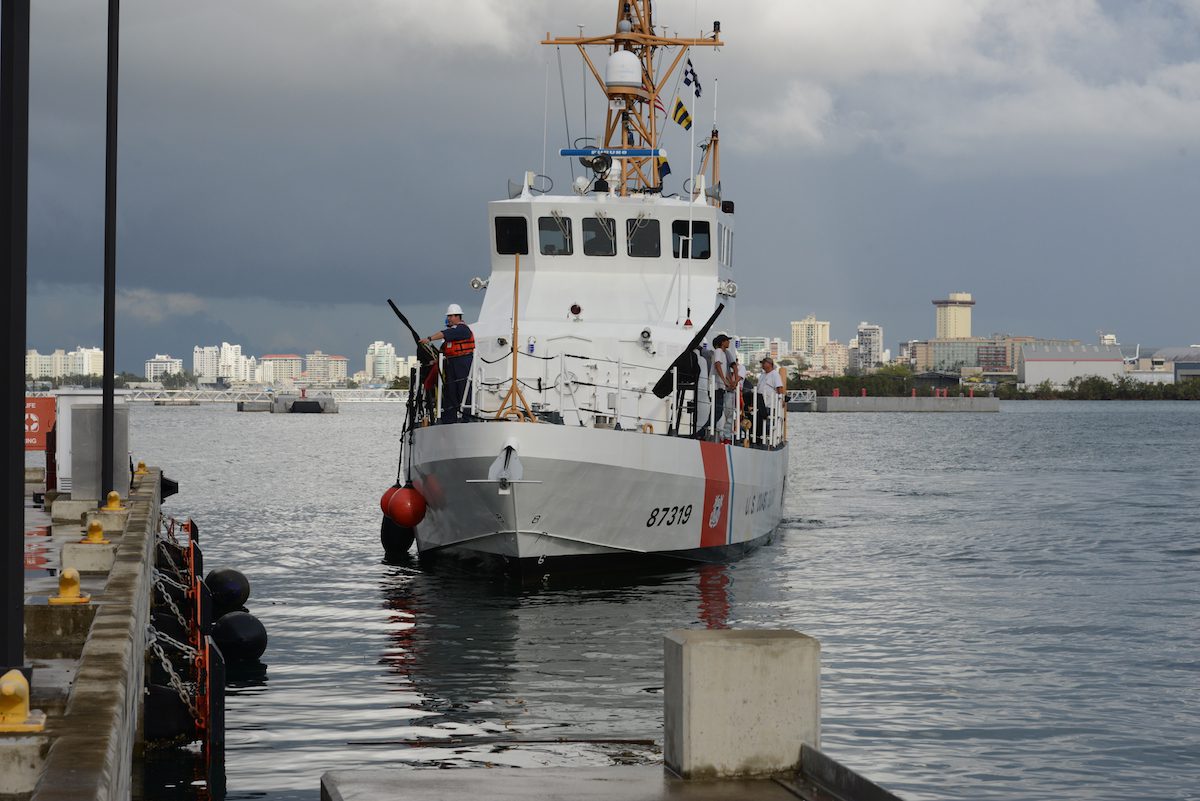Major Cocaine Bust: UK Border Force Seizes Record Shipment at London Gateway
In one of the UK’s largest drug seizures of the past decade, UK Border Force officers have seized cocaine with an estimated street value of £96 million (USD 130 million)...

Coast Guard Cutter Yellowfin returns to port in San Juan, Puerto Rico after departing the U.S. Virgin Islands due to Hurricane Maria Sunday, Sept. 17, 2017. U.S. Coast Guard photo by Petty Officer Jim Connor
The United States Coast Guard has closed all ports in Puerto Rico and the U.S. Virgin Islands due to Hurricane Maria, which made landfall as a Category 5 hurricane in Dominica overnight causing widespread devastation to the Caribbean island.
Effective 8 a.m. Tuesday, the Coast Guard Captain of the Port (COPT) San Juan, Capt. Eric King, set port condition ZULU for Puerto Rico and the U.S. Virgin Islands because of the possibility of sustained gale force winds greater than 39 mph that may arrive within 24 hours.
While port condition ZULU is in place, no vessels may enter or transit within these ports without permission of the COTP. Under the condition, all vessel movements are prohibited, and all ship-to-shore operations must cease until further notice.
In a statement, the Coast Guard sought to remind mariners that there are no safe havens in these facilities, and ports are safest when the inventory of vessels is at a minimum.
Since 8 p.m. Monday, port condition YANKEE has been in place for Puerto Rico and the U.S. Virgin Island. This means that all oceangoing vessels of 500 gross tons or more should have already departed the port unless having received an approved application to remain in port.
Starting Monday, the U.S. Coast Guard also began relocating personnel, cutters, and aircraft from areas in the U.S. Virgin Islands and Puerto Rico expected to be impacted by Hurricane Maria.
According to the National Hurricane Center, as of 11 a.m. ET Hurricane Maria was located approximately 150 miles southeast of St. Croix and moving west-northwest at about 10 mph. The storm is a “potentially catastrophic: category 5 hurricane on the Saffir-Simpson hurricane wind scale with maximum sustained winds of 160 mph. Some fluctuations in intensity are likely during the next day or two, but Maria is forecast to remain an extremely dangerous category 4 or 5 hurricane until it moves near or over the Virgin Islands and Puerto Rico on Wednesday, the NHC said.
Puerto Rico, as an unincorporated territory of the United States, is subject to Jones Act cabotage restrictions, which requires that seaborn cargo shipped between points in the U.S. be transported on vessels that are built in the United States and owned and crewed by American citizens.
However, since September 8, the Department of Homeland Security has had in place a limited waiver of the law to facilitate movement of refined petroleum products, including gasoline, diesel, and jet fuel, due to the disruption of fuel supplies in areas impacted by Hurricanes Harvey and Irma. This area includes Puerto Rico.
The waiver, which has already been extended once, is set to expire September 22, but it will be interesting to see whether the DHS decides to extend the waiver further due to Maria’s impact or continued impacts from Harvey and Irma.
Since the waiver was put in place, American maritime interests have questioned whether the temporary waiver necessary, citing the overwhelmingly large number of U.S.-flag vessels – not foreign vessels – that were sent to refuel Florida once ports had reopened following the passing of Irma.
So far only one operated, Phillips 66, is known to have used the waiver to book a foreign-flag vessel.

Sign up for gCaptain’s newsletter and never miss an update

Subscribe to gCaptain Daily and stay informed with the latest global maritime and offshore news


Stay informed with the latest maritime and offshore news, delivered daily straight to your inbox
Essential news coupled with the finest maritime content sourced from across the globe.
Sign Up